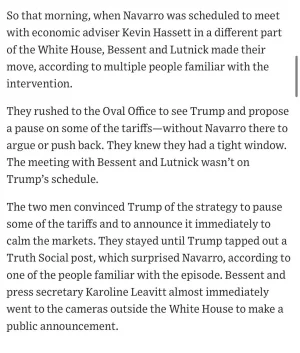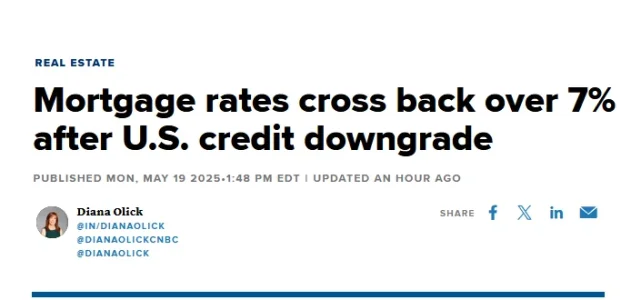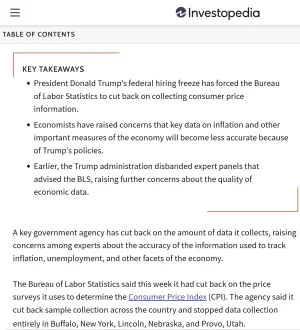You are using an out of date browser. It may not display this or other websites correctly.
You should upgrade or use an alternative browser.
You should upgrade or use an alternative browser.
Inflation
- Thread starter SlowUpTake
- Start date
More options
Who Replied?TomasM
Community Member
- MBTI
- INFJ
Sad but true @Wyote. I like eggs but, I don’t mind going with a substitute if the price quadruples.
For business that need eggs to operate, I feel bad for them. They’ve lost lots of money - especially small businesses.
Of course, nobody has been found guilty of price-fixing but it looks like there is an ongoing investigation.
For business that need eggs to operate, I feel bad for them. They’ve lost lots of money - especially small businesses.
Of course, nobody has been found guilty of price-fixing but it looks like there is an ongoing investigation.
- MBTI
- INFJ
- Enneagram
- 954 so/sx
Of course, nobody has been found guilty [ ] but it looks like there is an ongoing investigation.
Same shit, different day
SlowUpTake
Permanent Fixture
- MBTI
- INFJ
- Enneagram
- ?
that instills confidence (btw this is meant sarcastically)
SlowUpTake
Permanent Fixture
- MBTI
- INFJ
- Enneagram
- ?
22 million people lost their jobs in the first two months of the covid pandemic. With a 2 Trillion dollar infusion into the economy we got the 22 million jobs back over the course of two years (following the end of the covid caused shut down.) the great recession caused 9 million people to loose their jobs and it took 7 years to regain those jobs.
The 2021 American Rescue Plan increased the amount of the Child Tax Credit from $2,000 to $3,600 for qualifying children under age 6, and $3,000 for other qualifying children under age 18. The expansion led to a historic 46% decline in the U.S. child poverty rate in 2021, dropping from 9.7% to 5.2% but the credit was only legislated for 1 year and was not renewed, the expiration of that aid led to a historic increase in child poverty and 5 million more children lived in poverty in 2022 compared to 2021.
According to researchers at the Federal Reserve Bank of San Francisco (11/14/22), corporate media preoccupation with the negative noticeably deepened worries of a prolonged period of excess inflation: "Analyzing the volume and sentiment of daily news articles on inflation suggests that one-fourth of the increased gap between household and professional expectations [of future inflation] can be attributed to heightened negative media coverage." Corporate media alarmism also appears to have contributed to historically depressed consumer sentiment.
Studies show that both low unemployment and low inflation are associated with increased life satisfaction. However, the positive correlation between low unemployment and happiness is stronger than the negative correlation between inflation and happiness.
Central banks globally have historically struggled to push inflation up to 2%. The only Economic Deficits we should be concerned with are the deficits that affect our supplies of services and goods (this includes social services like health care, elder care and child care and goods like food and shelter).
There is a substantial disconnect between what corporations believe is sound economic policy and what is kinds of economic policies benefit the majority of people. But the corporations have learned to use their media assets and their highly developed psychological manipulation skills to convince the majority to perseverate over distracting and ill defined issues.
The 2021 American Rescue Plan increased the amount of the Child Tax Credit from $2,000 to $3,600 for qualifying children under age 6, and $3,000 for other qualifying children under age 18. The expansion led to a historic 46% decline in the U.S. child poverty rate in 2021, dropping from 9.7% to 5.2% but the credit was only legislated for 1 year and was not renewed, the expiration of that aid led to a historic increase in child poverty and 5 million more children lived in poverty in 2022 compared to 2021.
According to researchers at the Federal Reserve Bank of San Francisco (11/14/22), corporate media preoccupation with the negative noticeably deepened worries of a prolonged period of excess inflation: "Analyzing the volume and sentiment of daily news articles on inflation suggests that one-fourth of the increased gap between household and professional expectations [of future inflation] can be attributed to heightened negative media coverage." Corporate media alarmism also appears to have contributed to historically depressed consumer sentiment.
Studies show that both low unemployment and low inflation are associated with increased life satisfaction. However, the positive correlation between low unemployment and happiness is stronger than the negative correlation between inflation and happiness.
Central banks globally have historically struggled to push inflation up to 2%. The only Economic Deficits we should be concerned with are the deficits that affect our supplies of services and goods (this includes social services like health care, elder care and child care and goods like food and shelter).
There is a substantial disconnect between what corporations believe is sound economic policy and what is kinds of economic policies benefit the majority of people. But the corporations have learned to use their media assets and their highly developed psychological manipulation skills to convince the majority to perseverate over distracting and ill defined issues.
TomasM
Community Member
- MBTI
- INFJ
I think this statement depends on the reason for the unemployment and inflation. We also have to ask ourselves if people are satisfied and if has it been increasing or decreasing since COVID.Studies show that both low unemployment and low inflation are associated with increased life satisfaction.
To me it appears that a large majority of people are unsatisfied and that’s why they chose to predominantly vote for a large degree of change. I say this because people aren’t generally tolerant of big change and they have to be considerably uncomfortable if they choose it.
However, the positive correlation between low unemployment and happiness
This statement is conditional. If people are unemployed and happy then it implies that they are financially stable and not stressed about food, shelter, and possibly even leisure activities. Historically this is probably true but I would doubt that has been the case since Covid started. To me, people see over extended in debt, concerned about housing and food, and leisure has been significantly constrained.
This also causes significant dissatisfaction. An increase in inflation will result in a decrease in happiness (negative correlation) unless they have significant residual income after paying for food, shelter, leisure, and possibly other things. I don’t believe people are stable so it very much seems true to form. Even when they have residual income, they don’t typically like price increases but are more tolerant under those circumstances.is stronger than the negative correlation between inflation and happiness.
This is a very true statement; however I would probably substitute “corporations,” with special interest groups and lobbyists since these are the people that most dramatically affect policy. Individual corporations can have some influence if they are manipulating through bought politicians but if it were ever validated (difficult to do) then both could find legal action against them. Still, I believe it happens regularly.There is a substantial disconnect between what corporations believe is sound economic policy and what is kinds of economic policies benefit the majority of people.
True, but not all corporations have media influence. I believe what people have started to realize is that a majority of Fortune corporations have been captured by major stock funds. The three big that come to mind are BlackRock, Vanguard group, and State Street which have bought up enough shares in these companies to influence the corporate boards. All three of these companies are also significantly invested in each other. If a public company goes rogue and doesn’t comply with the demands of the fund managers then they can cut them off financially (through business contracts) from all the other companies where they have a controlling interest. They can also cause that company’s stock value to drop through a sell off and once this starts it’s difficult to make it stop. Once the company is unstable they can get board members voted off the board. More importantly, the big 3 control media in the same way, so if a company is in good standing then they will have positive influence but if they don’t then they will have an onslaught of negative influence. This is a big reason why nobody trusts the mainstream media, because it has become clear that they say things that are clearly biased towards greed and manipulation over the best interest of anyone except their selves. This is the power of Wall Street and one reason why I think people voted for change to start valuing Main Street.But the corporations have learned to use their media assets and their highly developed psychological manipulation skills to convince the majority to perseverate over distracting and ill defined issues.
If the corporations are controlled then the funding to politician is controlled. If the politicians are getting large degrees of funding then they are most likely being funded by those that have the most money (which comes to them in some very “creative” ways). This in turn influences public policy through legislation and bureaucratic “rules,” that give favor to those who have supported campaigns.
It’s a top down system that starts with the money. If we start evaluating who controls the money then we realize the source of the greed and the depth of the rabbit hole.
SlowUpTake
Permanent Fixture
- MBTI
- INFJ
- Enneagram
- ?
I think we can agree that "inflation" as the term is used has little to nothing to do with the amount of money in circulation and is really about the availablity of services and goods. I think it is also clear that robust employment and decent wages coupled with an abundance of fairly priced services and goods are what the average person perceives as a good economy.
The question that seems to be of the most interest (to me anyway) is how the public perceives the idea of a good economy. I think it is clear that an individulal can gage how the economy is on a personal level but how individuals perceive it on a macro level has way more nuanced influences. This is where the bias of the media landscape comes into play.
I am arguing that the macro perception of the economy is more heavily influenced by large corporate interests then by what is in the interest of the population. I belive that those interests are in many way divergent. But first I think it is clear that the media landscape is dominated by the interests of the large commercial players.
In commercial media owners hire, fire, set budgets and determine the over arching aims of the enterprise.
Journalists, editors and media professionals who rise to the top of the hierarchy tend to internalize the values, both commercial and political, of media owners. The firms that produce major newspapers and news broadcasts are large and powerful corporations, when the mass media is mainly owned by the very and run by very large corporations, this significantly affects the perspectives embodied in news reporting.
Agenda setting suggests that the media has the power to set the public agenda by choosing what to cover. This theory states that:
“People are aware or not aware, pay attention to or neglect, play up or downgrade specific features of the public scene.
People tend to include or exclude from their cognitions what the media includes or excludes from their content. People also tend to assign a given importance to what they include that closely resembles the emphasis given to events, issue, and persons by the mass media.” This theory is important as it shows the power that the media has in determining the issues of society.
Media outlets that are owned by major corporations are controlled by executives and trustees whose primary duty is to maximize the corporation's profits on behalf of the corporation's shareholders The traditional model of media ownership was for the organization's highest duty to be reporting the truth of events to the public, yet when a corporation is the owner truth may takes a backseat to profitability.
In an analysis of news articles from dozens of highly circulated US newspapers over the last 40 years, using machine-learning, .....stories from these newspapers that concern the overall performance of the US economy....removing any articles that appeared in the business section, because these often focus on the stock market and corporate earnings that make their coverage explicitly class-biased. The authors then measure the tone of the economic news and test whether it accurately reflects the growth of different income classes.
The findings are staggering. First, the content of economic news becomes overwhelmingly positive when incomes of the rich grow—but it is uncorrelated with the changes in welfare of the lesser-off, when accounting for the fortunes of the rich.
The question that seems to be of the most interest (to me anyway) is how the public perceives the idea of a good economy. I think it is clear that an individulal can gage how the economy is on a personal level but how individuals perceive it on a macro level has way more nuanced influences. This is where the bias of the media landscape comes into play.
I am arguing that the macro perception of the economy is more heavily influenced by large corporate interests then by what is in the interest of the population. I belive that those interests are in many way divergent. But first I think it is clear that the media landscape is dominated by the interests of the large commercial players.
In commercial media owners hire, fire, set budgets and determine the over arching aims of the enterprise.
Journalists, editors and media professionals who rise to the top of the hierarchy tend to internalize the values, both commercial and political, of media owners. The firms that produce major newspapers and news broadcasts are large and powerful corporations, when the mass media is mainly owned by the very and run by very large corporations, this significantly affects the perspectives embodied in news reporting.
Agenda setting suggests that the media has the power to set the public agenda by choosing what to cover. This theory states that:
“People are aware or not aware, pay attention to or neglect, play up or downgrade specific features of the public scene.
People tend to include or exclude from their cognitions what the media includes or excludes from their content. People also tend to assign a given importance to what they include that closely resembles the emphasis given to events, issue, and persons by the mass media.” This theory is important as it shows the power that the media has in determining the issues of society.
Media outlets that are owned by major corporations are controlled by executives and trustees whose primary duty is to maximize the corporation's profits on behalf of the corporation's shareholders The traditional model of media ownership was for the organization's highest duty to be reporting the truth of events to the public, yet when a corporation is the owner truth may takes a backseat to profitability.
In an analysis of news articles from dozens of highly circulated US newspapers over the last 40 years, using machine-learning, .....stories from these newspapers that concern the overall performance of the US economy....removing any articles that appeared in the business section, because these often focus on the stock market and corporate earnings that make their coverage explicitly class-biased. The authors then measure the tone of the economic news and test whether it accurately reflects the growth of different income classes.
The findings are staggering. First, the content of economic news becomes overwhelmingly positive when incomes of the rich grow—but it is uncorrelated with the changes in welfare of the lesser-off, when accounting for the fortunes of the rich.
Last edited:
TomasM
Community Member
- MBTI
- INFJ
If we are going to breach speculation and allow our intuitive minds to rise to the top over what we have been told then I can certainly engage this type of dialogue and discourse. It is important to note that even those with high levels of intuition and an intellectual mind developed enough to interpret there is still a margin of error. With this in mind, we must both assume a position of mutual respect within a desire to find truth rather than being right.I think we can agree that "inflation" as the term is used has little to nothing to do with the amount of money in circulation and is really about the availablity of services and goods. I think it is also clear that robust employment and decent wages coupled with an abundance of fairly priced services and goods are what the average person perceives as a good economy.
Yes, I do believe that inflation has little to do with the amount of money in circulation even if that spits in the face of economic theory. I believe that the majority of the money sits in pools of power at the top of the pyramid and the amount of money in circulation is small such that it can be managed (just like the people). Countries that know how to manage these structures are successful and those that do not are poor and unstable.
If we can agree that corporations are acting as a whole and in cooperation then yes I agree. This is no different than states of a union (also corporations) that are operating collectively as a whole. The rules are set for these corporate entities yet under the surface they operate in a way that is completely contradictory to these rules. Then loopholes are created on the surface to facilitate function and secrecy is used to conceal.I am arguing that the macro perception of the economy is more heavily influenced by large corporate interests then by what is in the interest of the population. I belive that those interests are in many way divergent. But first I think it is clear that the media landscape is dominated by the interests of the large commercial players.
Yes, there is most certainly an agenda, and that agenda at it's core is power at the highest level with layers of subordinates that are controlled. The methods of control, well, that's a very ugly thing to stare in the face.Agenda setting suggests that the media has the power to set the public agenda by choosing what to cover. This theory states that:
“People are aware or not aware, pay attention to or neglect, play up or downgrade specific features of the public scene.
People tend to include or exclude from their cognitions what the media includes or excludes from their content. People also tend to assign a given importance to what they include that closely resembles the emphasis given to events, issue, and persons by the mass media.” This theory is important as it shows the power that the media has in determining the issues of society.
The people are only told what they need to be told as a means of being managed. The organization and people change as it is necessary to maintain a confidence in the source of the information. This can come by rebranding, acquisition, or starting something grassroots that appears aligned with the influenced. Whatever it takes.
But let's be clear, the mass media does not control itself. They have their marching orders and we can see it in the same parroted words coming from every tentacle like an orchestra being directed by the conductor. This dissemination is wide and takes into account what is needed to appeal to the cultural groups based on their elevated status. In doing so, everyone gets to feel understood and right in their perspective.
It's all a sick and twisted game. The truth is usually the exact opposite of what everyone is being told.
Yes. Sad but true. I often ask myself how people can have such disregard for mass suffering. Still, I can't ignore that there is a drive in the human species that always seeks to gain at the expense of others. This drive has existed as far back in time that we can view in writings and the actions of people can even take delight in murder. This begs the question, if someone didn't take power at the top, would we ever be able to grow a society to the scale it currently sits globally? Can we breed or rid the species of its sick ambition or will we forever be subjected to cycles of build and destroy?First, the content of economic news becomes overwhelmingly positive when incomes of the rich grow—but it is uncorrelated with the changes in welfare of the lesser-off, when accounting for the fortunes of the rich.
These are hard questions and coming to terms with them is painful.
SlowUpTake
Permanent Fixture
- MBTI
- INFJ
- Enneagram
- ?

Huge decline at L.A. port is a hit to truckers—and a stark warning of coming tariff damage
Los Angeles is already experiencing a huge drop-off, and truckers in other cities will soon be hit, too.
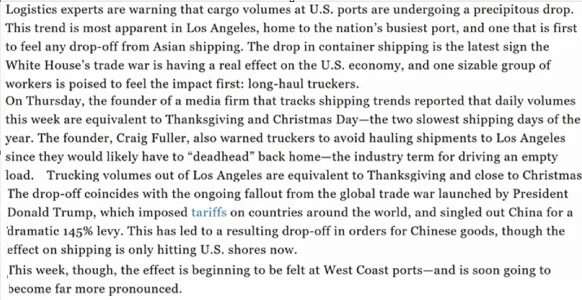
Scarcity of goods is a sure fire way to increase inflation.
SlowUpTake
Permanent Fixture
- MBTI
- INFJ
- Enneagram
- ?
SlowUpTake
Permanent Fixture
- MBTI
- INFJ
- Enneagram
- ?
"
Republicans in Congress are proposing an alternative plan: replacing income tax with a national sales tax. Representative Earl "Buddy" Carter introduced the FairTax Act of 2025, which calls for a tax-inclusive rate of 23% beginning in the 2027 tax year.
However, the Tax Policy Center estimates that for every dollar spent, this would amount to taxpayers paying about 30 cents in federal sales tax for every dollar spent.
Whether these proposals will ever be fully implemented remains unclear. However, with serious discussions underway about tariffs and consumption taxes — and with the IRS facing significant internal disruption" https://finance.yahoo.com/news/trump-plan-abolish-irs-forever-123100779.html
I wonder what that will mean for inflation? (that is sarcasm)
Republicans in Congress are proposing an alternative plan: replacing income tax with a national sales tax. Representative Earl "Buddy" Carter introduced the FairTax Act of 2025, which calls for a tax-inclusive rate of 23% beginning in the 2027 tax year.
However, the Tax Policy Center estimates that for every dollar spent, this would amount to taxpayers paying about 30 cents in federal sales tax for every dollar spent.
Whether these proposals will ever be fully implemented remains unclear. However, with serious discussions underway about tariffs and consumption taxes — and with the IRS facing significant internal disruption" https://finance.yahoo.com/news/trump-plan-abolish-irs-forever-123100779.html
I wonder what that will mean for inflation? (that is sarcasm)
SlowUpTake
Permanent Fixture
- MBTI
- INFJ
- Enneagram
- ?
SlowUpTake
Permanent Fixture
- MBTI
- INFJ
- Enneagram
- ?
TomasM
Community Member
- MBTI
- INFJ
When the government wants to sponge up money they usually do two things.
1) Target the area of interest while openly stating the reason. There’s usually an element of fear involved.
2) Create a distraction to keep eyes focused elsewhere while Hoovering up all of the money.
Now, I don’t like the Fed but I’ve always been concerned with shutting it down, because it does offer flexibility in the money supply. That said, its primary purpose is to keep inflation low while operating ethically. Yet inflation has been ridiculous and nobody trusts the Fed because there is zero transparency (by design).
So, we have reports coming that Powell is mismanaging the the 2.5B rebuild of the Fed building while scamming the people.
The Epstein story is in full swing.
Obama, has now been targeted over the creation of the Russia collusion with Gabbard presenting “new information.”
Russia is on a short timeline for a negotiation to stop the war in Ukraine.
To me, the biggest story is the Fed, because it is by far the biggest thief in US history (indirectly at best, but most likely in a direct manner) - IMO. I suspect we will get less truth about it than we will any of the other distractions. In fact, we might get more truth or even some manufactured truth when it comes to the other stories if there is too much interest starting to creep back towards the Fed.
When I think of changes in the money supply and policy to alter the Fed, I start looking at how gold was seized from everyone throughout the country. For those that don’t remember, it was illegal to own gold and it was snatched up by the government.

There better be a substantial amount of gold in Fort Knox.
There’s currently a bill in process to perform a full audit of the Fed. Hmmm.
1) Target the area of interest while openly stating the reason. There’s usually an element of fear involved.
2) Create a distraction to keep eyes focused elsewhere while Hoovering up all of the money.
Now, I don’t like the Fed but I’ve always been concerned with shutting it down, because it does offer flexibility in the money supply. That said, its primary purpose is to keep inflation low while operating ethically. Yet inflation has been ridiculous and nobody trusts the Fed because there is zero transparency (by design).
So, we have reports coming that Powell is mismanaging the the 2.5B rebuild of the Fed building while scamming the people.
The Epstein story is in full swing.
Obama, has now been targeted over the creation of the Russia collusion with Gabbard presenting “new information.”
Russia is on a short timeline for a negotiation to stop the war in Ukraine.
To me, the biggest story is the Fed, because it is by far the biggest thief in US history (indirectly at best, but most likely in a direct manner) - IMO. I suspect we will get less truth about it than we will any of the other distractions. In fact, we might get more truth or even some manufactured truth when it comes to the other stories if there is too much interest starting to creep back towards the Fed.
When I think of changes in the money supply and policy to alter the Fed, I start looking at how gold was seized from everyone throughout the country. For those that don’t remember, it was illegal to own gold and it was snatched up by the government.
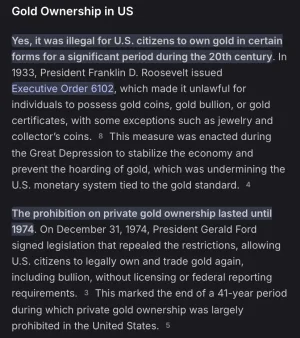
There better be a substantial amount of gold in Fort Knox.
There’s currently a bill in process to perform a full audit of the Fed. Hmmm.
SlowUpTake
Permanent Fixture
- MBTI
- INFJ
- Enneagram
- ?
sounds like fox news


